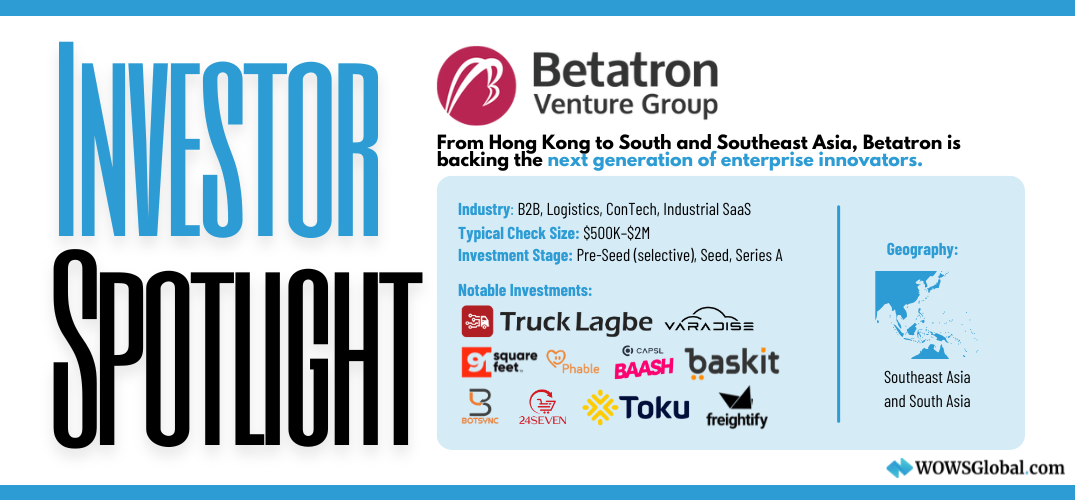Top 10 Factors To Consider Before Investing In A Startup
Startup Investing

Investing funds in startups gives the potential for significant returns. On the flip side, the risks need to be fully understood. This means that startup investors must take a variety of considerations into account before agreeing to any such investment.
While individual investor criteria will differ, here are 10 factors that all startup investors should bear in mind:
Understand the Service or Product and the Business Model
As a startup investor, you will have your preferred type(s) of business that you are prepared to invest in. With that, you should start by looking at what problem the startup intends to solve and why the business sector they are targeting needs what they are offering.
Ask yourself if they are offering a truly unique product or service or whether they are entering a mature market with something that is a realistic proposition. Answering these basic questions will help to decide if the product or service in question resonates with you.
In addition to that and to help you understand if the startup in question is a right fit for your investment style it is necessary to look at their business model. Doing so should answer many questions before you even consider looking at other aspects of the startup.
With that, the business model and projected growth stats should tell you just how realistic (or unrealistic!) such an investment will be.
The Founder’s Character and Their Ability to Execute
Would-be startup investors must make the effort to understand the true character of the founder (or co-founders). Take time to get to know them on a personal level while learning about their experience and background. While doing this, it is also important to carry out and obtain references.
As for their ability to execute, it is only natural (and necessary!) for a founder to be passionate about the product(s) or service(s) they are promoting. As will be seen next, startup investors should always place a major emphasis on the management team in place.
However, before doing that take a step back and consider the founder's ability to execute and successfully put into place what they are intent on bringing to market.
On this point, many founders have yet to launch a new venture. This should be understood and accepted but what all founders must be able to do is show through their previous experiences their ability to turn their concept into reality.
The Management Team - Skills & Passion
Assessing and understanding the skills and passion of the management team is essential. While other vital considerations need to be taken into account it is no secret that successful startup investors place significant emphasis on two elements of any investment opportunity they look at.
The first is the product or service being offered. The second is the overall leadership, passion, and ability of the management team to execute their stated business plan. It is the latter factor that potential investors need to be confident about. Unless the management team is experienced, qualified, and passionate then think very carefully before parting with your money.
What is the Potential Market
Before committing funds to a startup you must assess the business potential in the market sector they intend to operate in. As well as doing your own research it is important to speak with the founder and management team to understand what they see as being a realistic market share of the sector they are operating in.
A founder should have intimate knowledge of the overall market sector they intend to enter. With that, they need to demonstrate the projected market share that their startup intends to capture over given timescales.
To help establish the startup’s potential ask yourself questions such as:
- What is the past, present, and future market space the startup intends to operate in?
- Are the products or services being offered to solve a real need?
- Who are the startup's competitors and how dominant are they?
- How does the startup solution stack up against the competition?
- Does the startup own any Intellectual Property (IP) that could be of value down the line?
Many startup investors have experience in certain business sectors, products, and services. If that is you, use this experience to gauge whether what the startup is offering is realistic. It is only natural that the founder is convinced that their solution will be a runaway success. Investors need to temper that enthusiasm with reality.
How Involved Will you be?
This relates to how you intend to invest funds. Those who invest in a startup via a VC (Venture Capital) firm agreement are far less likely to have contact or interaction with the startup's management team. That is because the VC firm involved will have its management team in place to keep tabs and advise the startup in question.
However, investing as an angel investor is much more of a ‘hands-on’ role because such an investment grants the angel a stake in the startup. That allows them to be involved in the decision-making process.
Angel investors can also bring important skills, experience, and industry-specific contacts into play. These attributes can go a long way to helping the startup successfully build its business.
Those looking to invest in a startup should think clearly about how much or how little they want to be involved when funding a new venture.
How Will the Invested Funds be Used to Create Value?
It is important to understand how the startup plans to use the capital they are looking to raise. Through discussions with the founder and management team, they should explain how any allocated funds will be used to create maximum value.
By the very nature of a startup, growth forecasts will be theoretical. However, investors can use the projections given by founders to compare with other similar companies against current as well as future industry forecasted trends.
Startup investors need to be as confident as possible that any given funds will be used as effectively as possible to create maximum value.
Understand the Investment Period
We have all heard of the ‘overnight’ startup success stories. This is the exception rather than the rule. The vast majority of startup businesses take years to realize a profit. That means Investing in startups must be viewed as a long-term proposition.
Having said that, would-be investors need to have an idea of timelines to put that against their personal expectations. Ask yourself if you are comfortable waiting 5, 7, or 10 years for a return.
While this is not easy to evaluate, startup investors can look at the company’s track record to date. One angle here is looking at their burn rate (how much money they are spending each month). For example, an early-stage startup with a very high burn rate is likely to be a sign that investors will be waiting longer before any payout is received.
Be Clear on Expected ROI
Startup investors are known for their desire to help fledgling companies succeed. However, they are also looking to make money from their investments. This means investors must analyze the potential ROI (Return On Investment) if they are to maximize returns.
The returns will depend on the type of startup investment you are involved with. Angel investors will typically look for an annual return of between 30%-40% while those involved with venture capital investments are taking a bigger risk and therefore expect higher rates of return.
How Will Investment Affect Diversification?
Diversification has to be seen as the best investment practice. This is particularly important for startup investors. The main goal of any investment portfolio should be to minimize risk without too negative an impact on potential returns.
Startup investors should keep a close eye on how such investments will affect their overall asset mix and their risk level. However, that is easier said than done because finding the right balance can be challenging.
As a general rule the more startups you invest in the better the odds are of mitigating risk, increasing your exposure to growth opportunities, and achieving target returns. Conversely, spreading your investments too sparingly can backfire if at least one of the few chosen investments does not shine through as a winner.
Put in Place a Clear Exit Strategy
With any investment, you should have a definite exit strategy in place but this is particularly important for startup investors. Before committing funds you need to be clear on when and how you will go about withdrawing your initial investment plus any additional gains.
An example here relates to angel investors. They should be clear on the timescales involved for selling their equity share. Understanding that will give them an exit point they are comfortable with.
A Factor That WILL Give Startup Investors the Advantage
Investing in startups certainly has risks attached. However, choosing the right startups to invest in can bring substantial returns. As has been seen from the above there are many considerations to take into account before committing to startup funding.
This is where the professional, highly successful WOWS Global team is ready to assist. As South East Asia’s most active startup/investor matching platform we are on a mission to match your investment needs with like-minded startups.
Our secure, online digital ecosystem is second to none and allows investors to unlock exposure to SEA startups that are tailored to suit your investment needs.
WOWS can assist you in portfolio diversification and give access to exclusive cap table holdings in fast-growing private companies. Our bespoke investment solutions are customized to offer first-class investment opportunities based on your preferred industry, sector, and asset class.
As a preferred investor, the WOWS services include ease of portfolio management. That is achieved through personalized dashboards which allow you to track all of your investments in one place. You will also benefit from exclusive content that includes unique information on private companies in the form of diligence material, valuations, and much more.
If you would like to join the exclusive WOWS Investor Network please click here for consideration. Alternatively, feel free to reach out to WOWS for an initial, no-obligation discussion on exactly what we can offer at:
Related Posts
-

Startup Startup Growth Founder Health Habits
Startup Growth and the Surprising Power of Sleep: What the Data Says About Founder Health Habits
Forget the hustle myth. Founders who sleep smarter, not less, are scaling faster. The data reveals surprising links between sleep, wellness, and startup success. -

Betatron Venture Group Investing B2B SaaS Business Growth
Betatron Venture Group: Investing with the Exit in Mind Across Asia's B2B Frontier
Betatron Venture Group is a Hong Kong-based early-stage VC firm backing scalable B2B startups that digitize Asia’s largest traditional industries. With a US$50M fund and a disciplined focus on sectors like logistics, construction, fintech, and industrial SaaS, Betatron invests US$500K–$2M in Seed to Series A rounds across high-growth markets in South and Southeast Asia. The firm is known for its exit-focused thesis, deep regional network, and hands-on support guiding founders toward strategic acquisition or IPO. -

Financial mistakes startup Fractional CFO
Financial Mistakes That Hurt Businesses—Startups & SMEs Alike
Many startups and SMEs unknowingly make financial mistakes that hurt profitability, cash flow, and long-term success. From misinterpreting cash in the bank to scaling without financial planning, these pitfalls can be costly but avoidable. Discover the most common financial mistakes and how to fix them in this guide by WOWS Global. -

Startup MVP Lean Startup Feedback
The MVP: Turning Bare Bones Into Billion-Dollar Dreams (Or a Glorified Prototype)
The MVP (Minimum Viable Product) is your scrappy, bare-bones version of your grand vision. Learn how to strike the right balance between too minimal and too polished while preparing for an MVP launch in this startup guide. -

Southeast Asia Startup Ecosystem
Exploring Southeast Asia's vibrant Startup Ecosystem
Southeast Asia is home to a bustling startup ecosystem that is rapidly evolving and capturing the attention of investors and entrepreneurs alike. With its thriving economies, growing middle-class population, and increasing internet and smartphone penetration rates, the region offers immense potential for innovation and business growth. -

Startup Investment Southeast Asia
Why Southeast Asia is the Next Hotspot for Startup Investments
Southeast Asia is rapidly emerging as one of the world’s most promising regions for startup investments. With a growing population, a rising middle class, and a rapidly expanding digital economy, Southeast Asia presents a wealth of opportunities for investors looking to tap into this dynamic and rapidly evolving market. In this article, we’ll take a closer look at why Southeast Asia is the next hotspot for startup investments.
